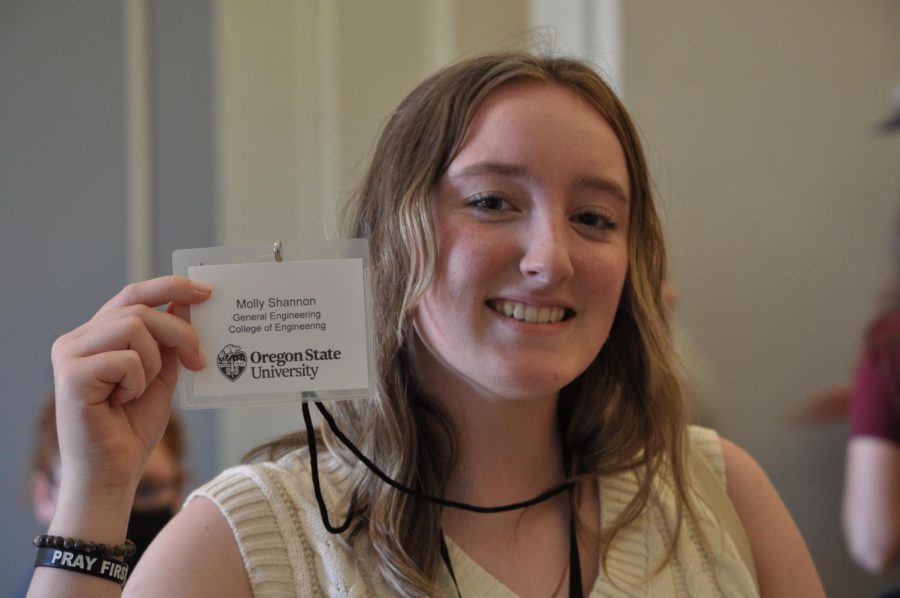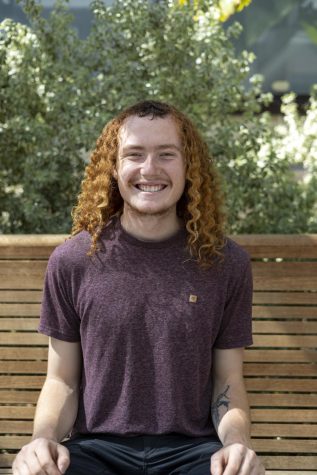START orientation aims to offer support to incoming students transitioning into college life
Molly Shannon shows off her guest badge for START at Oregon State University in the Memorial Union on Thursday June 23. START is being held in person this year for the first time since the start of the COVID-19 pandemic.
July 5, 2022
According to Olivia Eiler, a returning START leader at Oregon State University and an English and education major, the START orientation program functions to teach students how to be students.
“No one tells you how to function in college when in high school,” Eiler said. “We need to fill gaps, to help transition so they know what they are doing; so they can function as a student and know where they live and where to go when they need information…There is so much that students need to know that we don’t have the time or space to communicate. So many students today have different majors, paths, etc. and it is hard to distribute that amount of informa- tion cohesively.”
Since the onset of the COVID-19 pan- demic in 2020, OSU has had its new student orientation online, with this year being the first in three years to be held fully in person throughout the whole summer.
START functions as the orientation for new students entering OSU. It is a man- datory program for incoming freshmen, both international and domestic. There is also a START offered for transfer stu- dents which is more condensed to OSU specific information.
For over three years, the START program has been entirely virtual. The first in-person program session since 2019 was held June 23.
“All of our senior staff haven’t done an
in-person START before, even the most experienced staff…registration was slow,” Eiler said. “We know that we are the first people these people are seeing. We want to give them the best first impression that they can. We don’t want to convince someone who doesn’t want to be here [at OSU] to stay, but to reassure students that this is a good place to be.”
START is still offered virtually, for those who may be concerned about contracting COVID-19, or for those who are out of state or the country.
START is where incoming students reg- ister for classes, and it is held throughout the summer, split into 14 different in-person undergraduate freshman sessions, in order to accommodate different student’s sched- ules. The number of sessions is different for transfer students and those seeking to do START online.
START used to be a two day program with an overnight stay in the dorms on OSU’s Corvallis campus. The option to stay overnight in the dorms is still offered for the night before, in case students and families must travel far to the sessions. However, START now only takes place over the course of a single day.
According to Eiler, START has been made as bare bones as possible. It is a lot of information for people to handle and a lot will be forgotten, especially for students that have a START date very early in the summer. However, students still come away with important basic ideas, and know where to look for specific resources.
“If you have the option to stay in dorms at orientation do that,” said Molly Shannon, a prospective engineering major entering OSU. “I learned last night to buy a mattress topper for the bad beds.”
According to Shannon, one of the most helpful things was the financial aid presen- tation. Money, finances and tuition is an anxiety that many college students face. According to Honklanen, advising was also extremely helpful. START is where incoming students register for classes, which in turn makes an early START date advantageous
for getting first choice for certain classes. Many of the students interviewed expressed some level of concern about jumping into college after several years of online high school.
“Those few years online, I am going to be honest, I didn’t really pay attention,” said Xavier Thompson, a prospective mechanical engineering major entering OSU. “I played minecraft in my English class, it was a period where school did not feel real.”
However, these students expressed optimism for the upcoming years in college, and said that the START orientation had helped them to think about college and how it would work for them.
“I am really looking forward to living on my own, but with a bunch of others,” said River Honklanen, a prospective electrical and computer engineering major entering OSU. I am really excited and looking forward to it over high school finally going out on my own and doing my own thing so it will be kinda fun.”
For some students, entering college can be a difficult decision, and a difficult transition. With the added stresses of the COVID-19 pandemic, START, according to Eiler, is a time when students begin to recognize that they are not children anymore.
In START students begin to realize that this experience of university is real. It isn’t just an application or an email, and students need to commit to this, according to Eiler.
According to Eiler, students have rights. A students parents are not allowed to view a students grades, or to access a students aca- demic schedule. This is a level of control that many students have never had before and it is protected under the Family Educational Rights and Privacy Act.
“You are a functioning object in someone else’s agenda,” Eiler said. “I believe that col- lege is something personal, students taking a new form of agency over themselves.”
According to Eiler, this is a control that many students have never had before, and START can be the first time that many stu- dents start to recognize that.
According to Eiler, it can be difficult to communicate certain messages to incoming students. Many students come in without a major, or a clear direction.
“I have been doing student orientation since I was a junior in high school,” Eiler said. “I am on the cuspe of something great, that is the feeling I got when I first came here.”











































































































